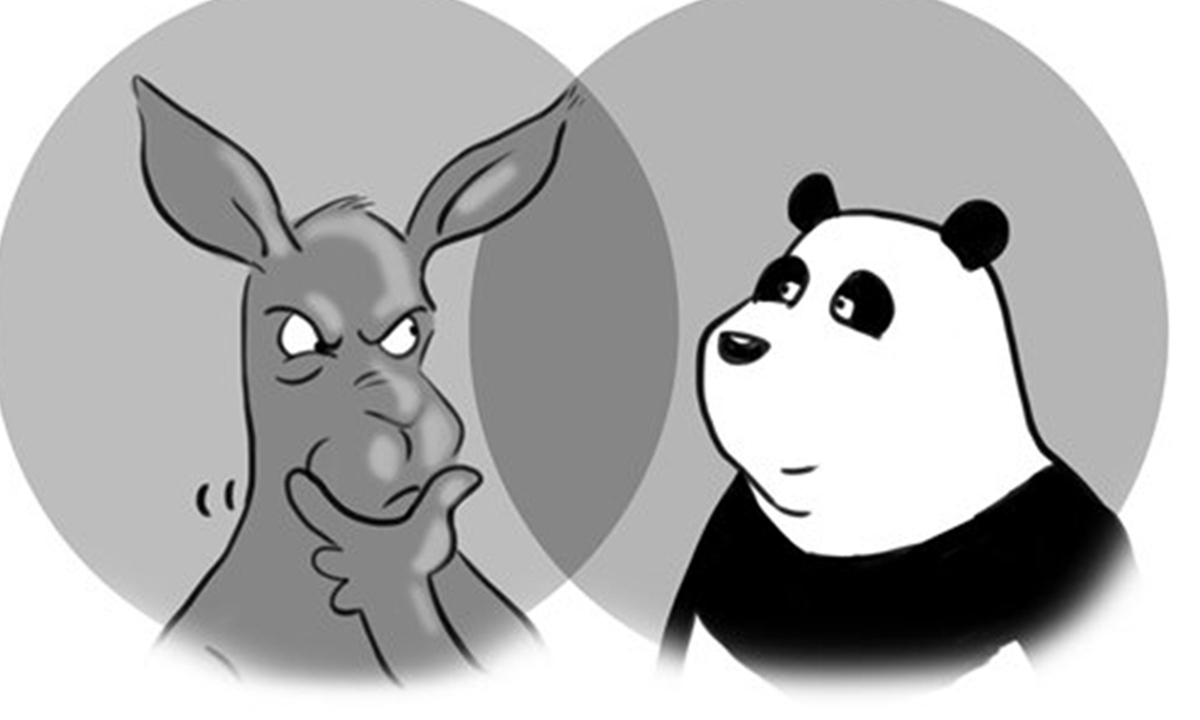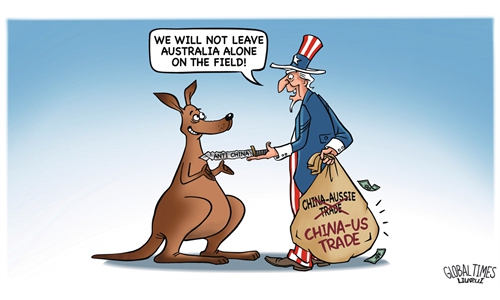
China Australia Illustration: Liu Rui/GT
James Laurenceson, director of the Australia-China Relations Institute at the University of Technology Sydney, said in an interview with Global Times that "many Australian businesses are very disappointed by Beijing" as their exports to China suffered an evident drop because of the China-Australia dispute. Yes, many Australian businesses are disappointed. But their disappointment is not merely toward China. They must be clearly aware that the root cause of the deterioration of China-Australia relations does not lie in China, but lies in the Morrison administration, which has repeatedly trodden on China's red line on issues concerning China's core interests. It's believed they may have more dissatisfaction toward their own government.Laurenceson said, "The Morrison government's diplomatic approach toward China is locked in … Meanwhile, there's little evidence of a course correction in Beijing either." What kind of a "course correction" does Australia want to see?
First, the country hopes China changes its policy toward Australia and not to react violently against its provocations. Canberra also wants Beijing to understand Australia's following the US' suit in strategic deployment, even though these moves are to contain China. However, the fact is that Australia's constant provocations on China are the root cause of the deterioration of China-Australia ties. And China's responses have just been a rational reaction to Australia's provocations.
Second, Canberra may also want Beijing to change its manner on foreign policy. Australia has constantly said China's diplomacy has become increasingly assertive. In fact, China's hard-line stance is mainly shown on issues that concern its core interests, such as the Taiwan question. China is reluctant to have frictions with Australia, the US as well as its allies as long as they do not interfere with China's internal affairs and undermine China's interests.
In Australia, being tough on China has become "politically correct" now. On the Taiwan question, Australian Defense Minister Peter Dutton's provocation against China has even surpassed that of the US. The Biden administration still wants to continue the previous strategic ambiguity on issues such as whether to "defend Taiwan." However, Dutton said on Friday that Australia would join the US to "defend Taiwan" if the Chinese mainland attacked the island. Such remarks are undermining the fundamental principle of China-Australia relations. The fact is, Australia has challenged China's bottom line, but it expects China not to fight back.
Laurenceson also said in the interview that Morrison and Dutton's rhetoric "makes it clear that they see talking up the China threat as a useful domestic political strategy." I agree with this point.
Morrison's approval rating has fallen. The performance of his government in domestic affairs is not satisfactory. For the sake of getting reelected next year, he has continued to distract voters from focusing on core issues and covering up his domestic political failures by playing up the "China threat."
Australian politics has fallen into a strange situation where if one encourages better relations and cooperation with China, he or she will be regarded as disloyal to Australia.
With the federal election coming up in 2022, Australian politicians will definitely hype subjects on China again. However, the public has been rather numb to this old trick since Australian politicians including Morrison and Dutton have constantly hyped the "China threat." Data from the Australia-China Relations Institute at the University of Technology Sydney showed that Australia's closest allies, led by the US, have become the biggest beneficiaries of China-Australia dispute. This has caused many discussions among Australian public opinion. In fact, many Australians have begun to doubt whether Morrison and Dutton's harsh attitude toward China is for the interests of Australia or for their own political ends.
Against such a political backdrop, it's difficult to see any substantial improvement in China-Australia relations at least before the 2022 federal election in Australia. The Morrison administration has neither the capability nor the willingness to improve the relationship.
A deterioration in China-Australia relations will be more detrimental to Australia. If Australia feels it is not in a hurry to repair its relations with China, then it is an even less pressing matter for China. And in case Australia continues to follow the US' suit in treading on China's red line on issues that concern China's core interests, China will certainly respond with hard-line steps.
The article was compiled by Global Times based on an interview with Ning Tuanhui, an assistant research fellow at the China Institute of International Studies. opinion@globaltimes.com.cn

